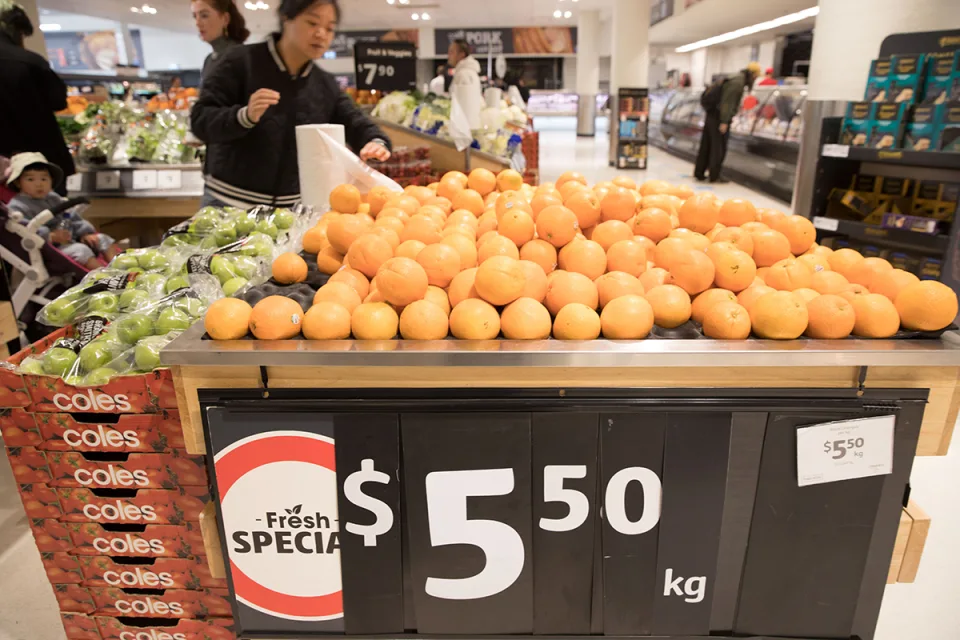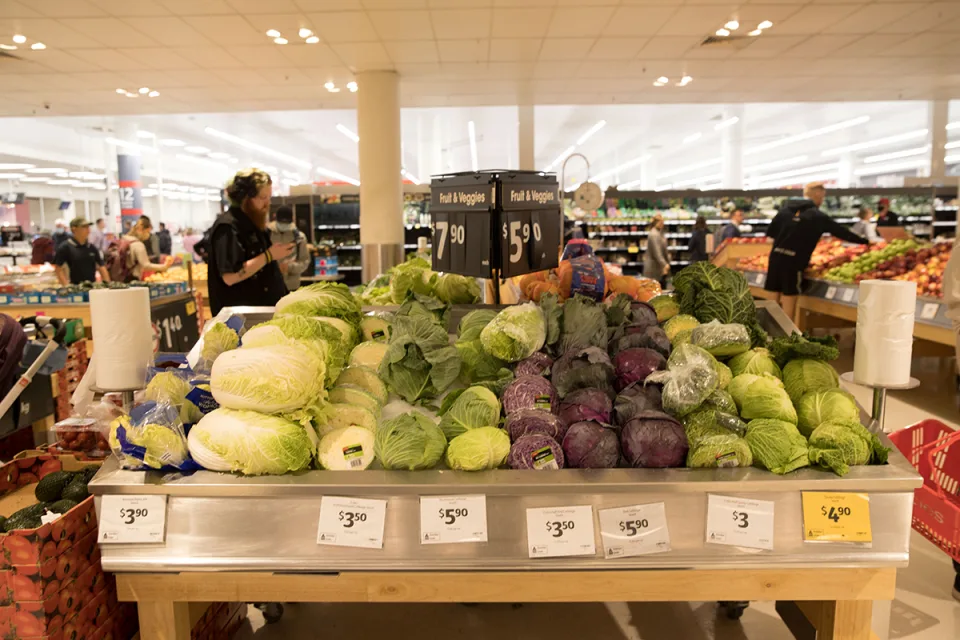Who’s to blame for the skyrocketing cost of living? Outraged farmer accuses Woolworths and Coles of jacking up prices of fruits and vegetables
By
- Replies 9
It's no secret that the cost of living in Australia is on the rise - in fact, you’re probably getting a little sick of us harping on about it. But who is to blame?
According to Guy Gaeta, Chair of the NSW Farmers Horticulture Committee, it's the supermarkets.
Mr Gaeta, who is a third-generation apple and cherry farmer from Orange, NSW, accused Woolworths and Coles of increasing the prices of fresh produce.
"It's not against the law, price gouging... but it's [fresh produce] an essential item," he said.
"It's sad. There are families that walk past [the produce aisle] and say, 'I can't afford that'."
The farmer claimed that the supermarkets are "manipulating" the market by pushing smaller greengrocers and retailers out of business and negotiating the lowest possible price for fruits and vegetables with farmers.
He also noted that farmers are not receiving any benefits from the price hikes on their own products.
"If farmers were getting $10 for a lettuce, we'd be driving Ferraris," he quipped.

NSW Farmers Horticulture Committee chair Guy Gaeta said that farmers are not receiving any benefits from the price hikes, alleging supermarkets of manipulating the market for their own good. Credit: Getty Images.
Aside from the lack of benefits, farmers are also burdened with the transport costs to deliver the produce from their farms to distribution centres.
Mr Gaeta explained: "They have costs too, but we aren't putting 80 per cent on top of the price we agreed on. We [farmers] are not ripping anybody off."
Woolworths and Coles have spoken out against the accusations, claiming that they're committed to providing value to customers – especially at a time when many families are struggling with the rising cost of living.
"It's impossible to escape the cost of living," a Woolworths spokesperson said.
The spokesperson went on to say that raising prices – by as much as 80 per cent, as has been alleged – would be like "shooting yourself in the foot".
Additionally, the spokesperson emphasised that while profit margins in the supermarket industry are really tight, it's still in the retailer's interests to ensure that the agriculture industry thrives.

Coles and Woolworths emphasised their commitment to provide value to their customers and to keep their prices low. Credit: Getty Images.
In a separate statement, Woolworths also clarified that the prices of fruits and vegetables in its stores are determined by the amount of money they paid to acquire them.
A spokesperson, who claimed that the retailer is paying more money to vegetable suppliers, explained: "We pay farmers the market price for their produce, which can vary throughout the year due to weather, seasonality, supply and demand. Last year, when the market price for fruit and veg was in decline, we passed those savings on to customers in the supermarket."
"The big reason prices are up on some varieties is the reduced supply in the market, following the East Coast floods and ongoing bad weather in key growing regions."
"We operate in a highly competitive market and we're always working to strike the right balance so suppliers receive a fair market price and our customers have access to affordable fresh produce."
Meanwhile, a Coles spokesperson commented on the issue, saying that the company is focused on keeping costs down for customers amidst the skyrocketing costs of living.
The spokesperson said: "We appreciate that there are a number of factors driving inflation for all retailers, including increases in the cost of raw materials, energy price rises, freight costs, extreme weather events and ongoing Covid impacts."
"We are committed to continuing to build strong, multi-generational, collaborative partnerships with Australian farmers and producers, including long-term contracts, which is why so many growers want to work directly with Coles. These partnerships enable us to source directly from suppliers and help us secure fresher produce at great value for our customers."
"The price of produce is a factor of supply and demand; however, our team is working hard to get prices down for our customers as quickly as we can. Our customers can expect to see an improved volume of many fresh produce lines in coming weeks thanks to the extraordinary efforts of our growers."
It should be noted that both supermarket chains are signatories of the Food and Grocery Code — a code of conduct designed to improve standards of business conduct in the food and grocery sector.
The code, which is voluntary, is regulated by the Australian Competition and Consumer Commission (ACCC). German retailer Aldi is also among the first signatories of the code.
What are your thoughts on this? Do you think this farmer was in the right for claiming that supermarkets are the culprit for the rising costs of living? Let us know your insights in the comments below.
According to Guy Gaeta, Chair of the NSW Farmers Horticulture Committee, it's the supermarkets.
Mr Gaeta, who is a third-generation apple and cherry farmer from Orange, NSW, accused Woolworths and Coles of increasing the prices of fresh produce.
"It's not against the law, price gouging... but it's [fresh produce] an essential item," he said.
"It's sad. There are families that walk past [the produce aisle] and say, 'I can't afford that'."
The farmer claimed that the supermarkets are "manipulating" the market by pushing smaller greengrocers and retailers out of business and negotiating the lowest possible price for fruits and vegetables with farmers.
He also noted that farmers are not receiving any benefits from the price hikes on their own products.
"If farmers were getting $10 for a lettuce, we'd be driving Ferraris," he quipped.
NSW Farmers Horticulture Committee chair Guy Gaeta said that farmers are not receiving any benefits from the price hikes, alleging supermarkets of manipulating the market for their own good. Credit: Getty Images.
Aside from the lack of benefits, farmers are also burdened with the transport costs to deliver the produce from their farms to distribution centres.
Mr Gaeta explained: "They have costs too, but we aren't putting 80 per cent on top of the price we agreed on. We [farmers] are not ripping anybody off."
Woolworths and Coles have spoken out against the accusations, claiming that they're committed to providing value to customers – especially at a time when many families are struggling with the rising cost of living.
"It's impossible to escape the cost of living," a Woolworths spokesperson said.
The spokesperson went on to say that raising prices – by as much as 80 per cent, as has been alleged – would be like "shooting yourself in the foot".
Additionally, the spokesperson emphasised that while profit margins in the supermarket industry are really tight, it's still in the retailer's interests to ensure that the agriculture industry thrives.
Coles and Woolworths emphasised their commitment to provide value to their customers and to keep their prices low. Credit: Getty Images.
In a separate statement, Woolworths also clarified that the prices of fruits and vegetables in its stores are determined by the amount of money they paid to acquire them.
A spokesperson, who claimed that the retailer is paying more money to vegetable suppliers, explained: "We pay farmers the market price for their produce, which can vary throughout the year due to weather, seasonality, supply and demand. Last year, when the market price for fruit and veg was in decline, we passed those savings on to customers in the supermarket."
"The big reason prices are up on some varieties is the reduced supply in the market, following the East Coast floods and ongoing bad weather in key growing regions."
"We operate in a highly competitive market and we're always working to strike the right balance so suppliers receive a fair market price and our customers have access to affordable fresh produce."
Meanwhile, a Coles spokesperson commented on the issue, saying that the company is focused on keeping costs down for customers amidst the skyrocketing costs of living.
The spokesperson said: "We appreciate that there are a number of factors driving inflation for all retailers, including increases in the cost of raw materials, energy price rises, freight costs, extreme weather events and ongoing Covid impacts."
"We are committed to continuing to build strong, multi-generational, collaborative partnerships with Australian farmers and producers, including long-term contracts, which is why so many growers want to work directly with Coles. These partnerships enable us to source directly from suppliers and help us secure fresher produce at great value for our customers."
"The price of produce is a factor of supply and demand; however, our team is working hard to get prices down for our customers as quickly as we can. Our customers can expect to see an improved volume of many fresh produce lines in coming weeks thanks to the extraordinary efforts of our growers."
It should be noted that both supermarket chains are signatories of the Food and Grocery Code — a code of conduct designed to improve standards of business conduct in the food and grocery sector.
The code, which is voluntary, is regulated by the Australian Competition and Consumer Commission (ACCC). German retailer Aldi is also among the first signatories of the code.
What are your thoughts on this? Do you think this farmer was in the right for claiming that supermarkets are the culprit for the rising costs of living? Let us know your insights in the comments below.







